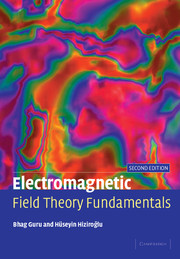Book contents
- Frontmatter
- Contents
- Preface
- Acknowledgments
- 1 Electromagnetic field theory
- 2 Vector analysis
- 3 Electrostatics
- 4 Steady electric currents
- 5 Magnetostatics
- 6 Applications of static fields
- 7 Time-varying electromagnetic fields
- 8 Plane wave propagation
- 9 Transmission lines
- 10 Waveguides and cavity resonators
- 11 Antennas
- 12 Computer-aided analysis of electromagnetic fields
- Appendix A Smith chart and its applications
- Appendix B Computer programs for various problems
- Appendix C Useful mathematical tables
- Index
3 - Electrostatics
Published online by Cambridge University Press: 05 June 2012
- Frontmatter
- Contents
- Preface
- Acknowledgments
- 1 Electromagnetic field theory
- 2 Vector analysis
- 3 Electrostatics
- 4 Steady electric currents
- 5 Magnetostatics
- 6 Applications of static fields
- 7 Time-varying electromagnetic fields
- 8 Plane wave propagation
- 9 Transmission lines
- 10 Waveguides and cavity resonators
- 11 Antennas
- 12 Computer-aided analysis of electromagnetic fields
- Appendix A Smith chart and its applications
- Appendix B Computer programs for various problems
- Appendix C Useful mathematical tables
- Index
Summary
Introduction
Armed with the necessary tools of vector operations and vector calculus, we are now ready to explore electromagnetic field theory. In this chapter, we study static electric fields (electrostatics), due to charges at rest. A charge can either be concentrated at a point or distributed in some fashion. In any case, the charge is assumed to be constant in time.
We begin our discussion by stating Coulomb's law of electrostatic force between two point charges fixed in space. We define the electric field intensity as the force per unit charge. We then want to establish that
The electric field intensity is irrotational or conservative, and
The work done in moving a charge from one point to another in an electrostatic field is independent of the path taken and depends only upon the endpoints of the path.
We will express the electric field intensity in terms of electric potential and deduce an expression for the energy required to move a charge from one location to another in an electrostatic field.
We will also explore the influence of the medium on electrostatic fields and define bound charge densities; examine several methods (Gauss's law, Poisson's and Laplace's equations, method of images) of solving electrostatic field problems; and develop the concept of capacitance and obtain an equation for the energy stored in a capacitor.
Information
- Type
- Chapter
- Information
- Electromagnetic Field Theory Fundamentals , pp. 70 - 136Publisher: Cambridge University PressPrint publication year: 2004
Accessibility standard: Unknown
Why this information is here
This section outlines the accessibility features of this content - including support for screen readers, full keyboard navigation and high-contrast display options. This may not be relevant for you.Accessibility Information
- 1
- Cited by
